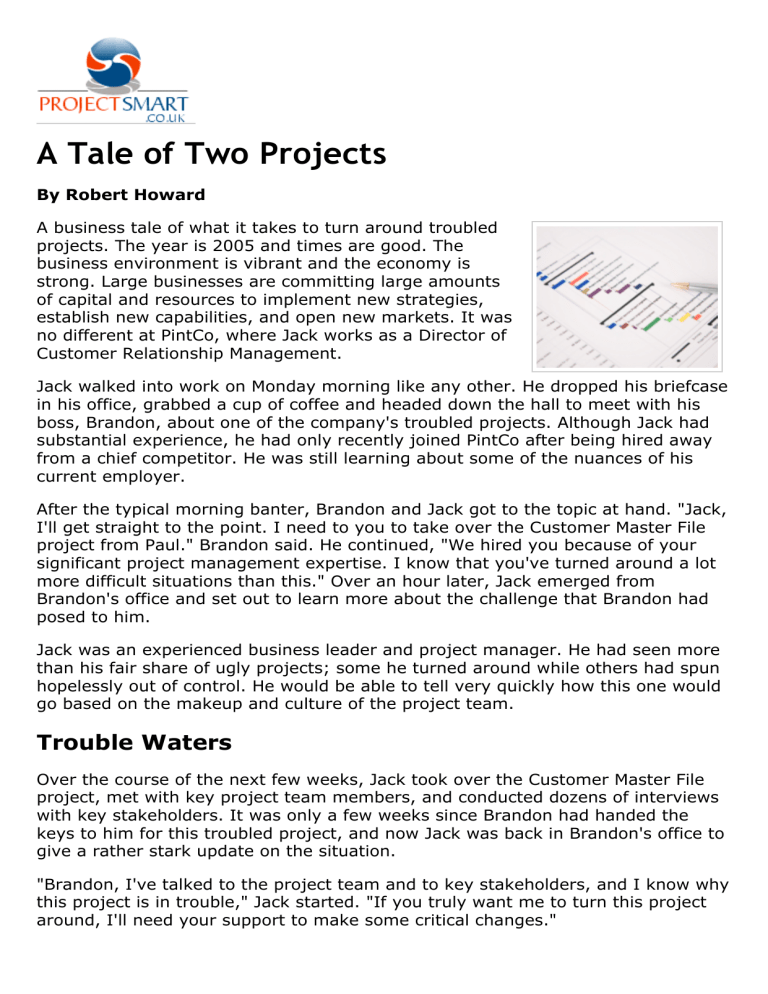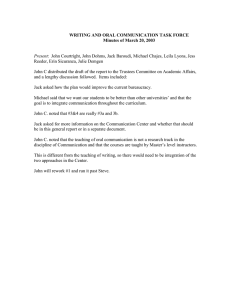
A Tale of Two Projects By Robert Howard A business tale of what it takes to turn around troubled projects. The year is 2005 and times are good. The business environment is vibrant and the economy is strong. Large businesses are committing large amounts of capital and resources to implement new strategies, establish new capabilities, and open new markets. It was no different at PintCo, where Jack works as a Director of Customer Relationship Management. Jack walked into work on Monday morning like any other. He dropped his briefcase in his office, grabbed a cup of coffee and headed down the hall to meet with his boss, Brandon, about one of the company's troubled projects. Although Jack had substantial experience, he had only recently joined PintCo after being hired away from a chief competitor. He was still learning about some of the nuances of his current employer. After the typical morning banter, Brandon and Jack got to the topic at hand. "Jack, I'll get straight to the point. I need to you to take over the Customer Master File project from Paul." Brandon said. He continued, "We hired you because of your significant project management expertise. I know that you've turned around a lot more difficult situations than this." Over an hour later, Jack emerged from Brandon's office and set out to learn more about the challenge that Brandon had posed to him. Jack was an experienced business leader and project manager. He had seen more than his fair share of ugly projects; some he turned around while others had spun hopelessly out of control. He would be able to tell very quickly how this one would go based on the makeup and culture of the project team. Trouble Waters Over the course of the next few weeks, Jack took over the Customer Master File project, met with key project team members, and conducted dozens of interviews with key stakeholders. It was only a few weeks since Brandon had handed the keys to him for this troubled project, and now Jack was back in Brandon's office to give a rather stark update on the situation. "Brandon, I've talked to the project team and to key stakeholders, and I know why this project is in trouble," Jack started. "If you truly want me to turn this project around, I'll need your support to make some critical changes." Brandon, a 20-year veteran at PintCo, knew what was coming. He had seen too many projects start, flounder, and then fail at the company. He didn't want to hear that another project was on the brink of failure, but he asked anyway, "What did you find out, Jack, and what can I do to help?" Jack drew a deep breath and began to explain his findings. "Brandon, as you know this project has been in flight for nearly 6 months now and it is already behind schedule and over budget." Jack went on, "In talking to the project team and other stakeholders, I don't see the situation getting better without making some pretty significant changes." Jack's experience helped him to quickly identify a number of critical issues with the project, which he carefully outlined for Brandon: "The scope of the project is not well defined," "The IT architects are sitting in their ivory towers and disagree with the project's direction," "The project team is not functioning as a team," "There is a lack of clear executive sponsorship, and" "Steve from Marketing is trying to manipulate this project for his own political gain." "I'm not going to sugar coat this for you Brandon," Jack explained. "I've seen this situation far too often in my career, and if we don't change the situation this project will fail in glorious fashion." Foundations for Success Brandon knew that what Jack said was true, and he also knew that changing the situation would be difficult, painful, and potentially costly. He reluctantly agreed with Jack, and together they laid out several key changes. "Thanks for working with me on this Brandon," Jack said. "Just to confirm, let me summarise the changes that we agreed to implement: "First, we're going to stop the current project and recreate a clear and welldefined scope and get consensus buy-in on the new scope." "Second, we're going end the architectural holy wars by assigning key IT architects to the project on a full time basis." "Third, we're going to co-locate the team and assign members to a full-time basis on the project. No more part-time participation." "Fourth, Brandon, you agree to be much more visible and an active participant to drive key decisions for the project, and" "Finally, Brandon - you are going to have a heart-to-heart with Steve and if necessary his boss - to eliminate any political agendas that could derail the project." Brandon and Jack both agreed with the plan. Jack knew that some of these changes would be unpopular, but without them the project would be doomed. He left Brandon's office with a sense of relief and apprehension. There was still a lot of hard work and heavy lifting yet to be done... Celebrations Six months later, Jack ran into Brandon in the break room as they both were angling for their morning coffee refill. "Jack!", Brandon shouted while patting Jack on the back. "Congratulations on getting the Customer Master File project into pilot. By all accounts, it has been a resounding success!" Brandon crowed. "Thank you," Jack smiled and answered, "but you know it was pretty touch and go after we met in your office to plan the project turnaround. There were a lot of unhappy campers and several of them didn't like the idea of being assigned 100% to the project if you recall." "But we quickly converted them - and now I see a project team that is hitting on all cylinders," Jack added. "In fact, Sharon told me she was ready to quit six months ago - and now she's happier than ever and up for promotion." Jack explained. "I love it when a plan comes together," Jack said proudly as he turned to walk away and take on his next big project. Robert Howard is the Founder and Chief Executive of ClearBrick LLC, a leading provider of customer experience business solutions , research, and online customer experience advice. © 2013 Project Smart. All rights reserved.


